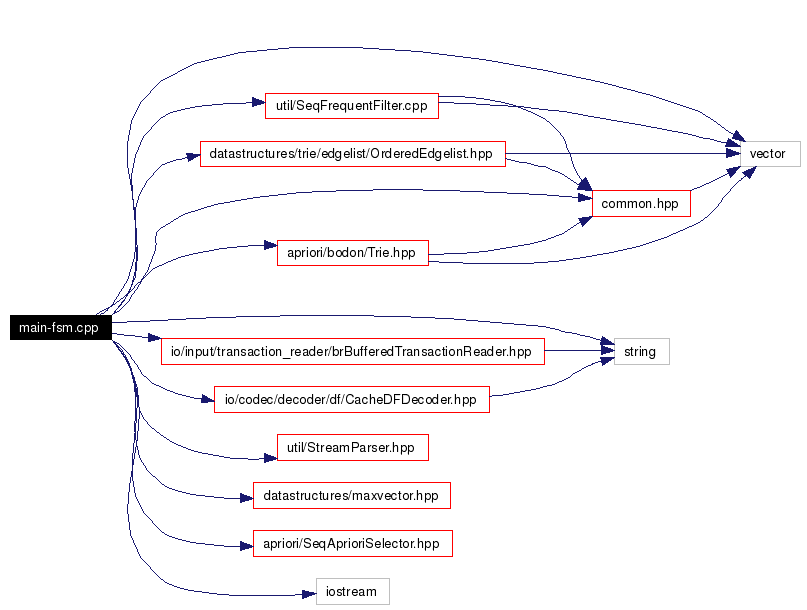
#include "common.hpp"
#include "io/input/transaction_reader/brBufferedTransactionReader.hpp"
#include "io/codec/decoder/df/CacheDFDecoder.hpp"
#include "util/StreamParser.hpp"
#include "util/SeqFrequentFilter.cpp"
#include "datastructures/maxvector.hpp"
#include "datastructures/trie/edgelist/OrderedEdgelist.hpp"
#include "apriori/bodon/Trie.hpp"
#include "apriori/SeqAprioriSelector.hpp"
#include <vector>
#include <iostream>
#include <string>
Include dependency graph for main-fsm.cpp:

Go to the source code of this file.
Functions | |
| void | init () |
| void | usage () |
| commandline -- some utility methods for fim commandline tools. | |
| int | process_arguments (int argc, char *argv[], counter_t &min_supp, bool &isrel, double &relminsupp, unsigned int &maxsize) |
| This procedure processes the arguments. | |
| int | main (int argc, char *argv[]) |
Variables | |
| std::string | file_format |
Mining frequent sequence of item is a natural generalization of frequent itemset mining (FIM). Given a sequence of transactions, where each transaction is a sequence over an alphabet  , we have to find the sequences that occure as a subsequence in at least
, we have to find the sequences that occure as a subsequence in at least  number of transactions. A sequence
number of transactions. A sequence  is a subsequence of
is a subsequence of  if there exist integers
if there exist integers  , such that
, such that  , i.e. we can get $s$ by deleting some items from
, i.e. we can get $s$ by deleting some items from  . For example
. For example  because
because  meet the requirements.
meet the requirements.
Currently this program only contains a trie-based Apriori implementation. For more information about this solution the reader is referred to the paper "A Trie-based APRIORI Implementation for Mining Frequent Item sequences" from Ferenc Bodon. It can be downloaded from the webpage of OSDM'05 workshop of ACM SIGKDD (http://www.cs.rpi.edu/~zaki/OSDM05/papers/p56-bodon.pdf).
Definition in file main-fsm.cpp.
|
|
Definition at line 52 of file main-fsm.cpp. References file_format. |
|
||||||||||||
|
Definition at line 149 of file main-fsm.cpp. References SeqFrequentFilter< IT_R >::findFrequentItems(), init(), process_arguments(), FileReprBase::READ, usage(), and FileReprBase::WRITE. |
|
||||||||||||||||||||||||||||
|
This procedure processes the arguments.
Definition at line 88 of file main-fsm.cpp. References convert(), largest_itemsetsize, and usage(). |
|
|
commandline -- some utility methods for fim commandline tools.
Definition at line 63 of file main-fsm.cpp. References file_format. |
|
|
Definition at line 50 of file main-fsm.cpp. |
 1.4.4
1.4.4